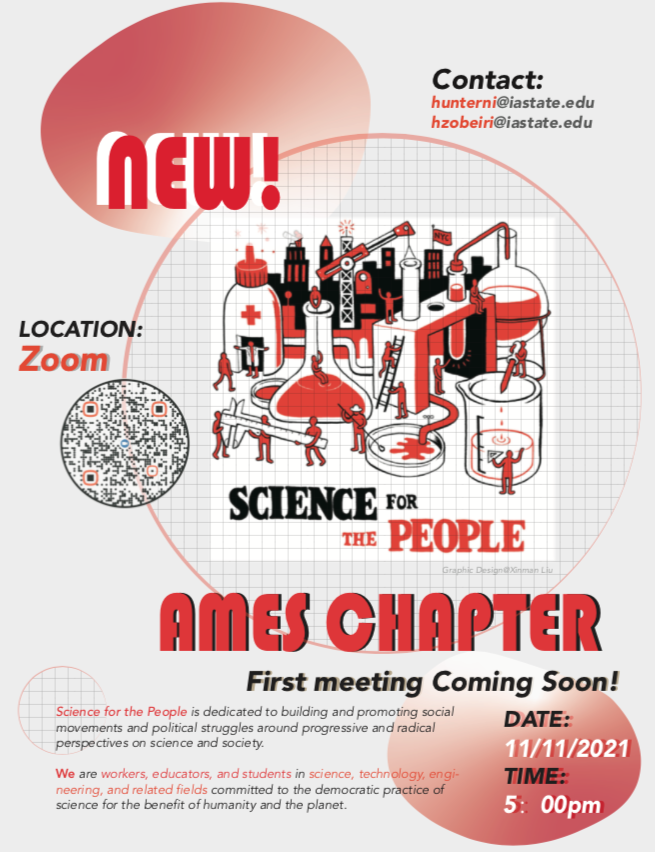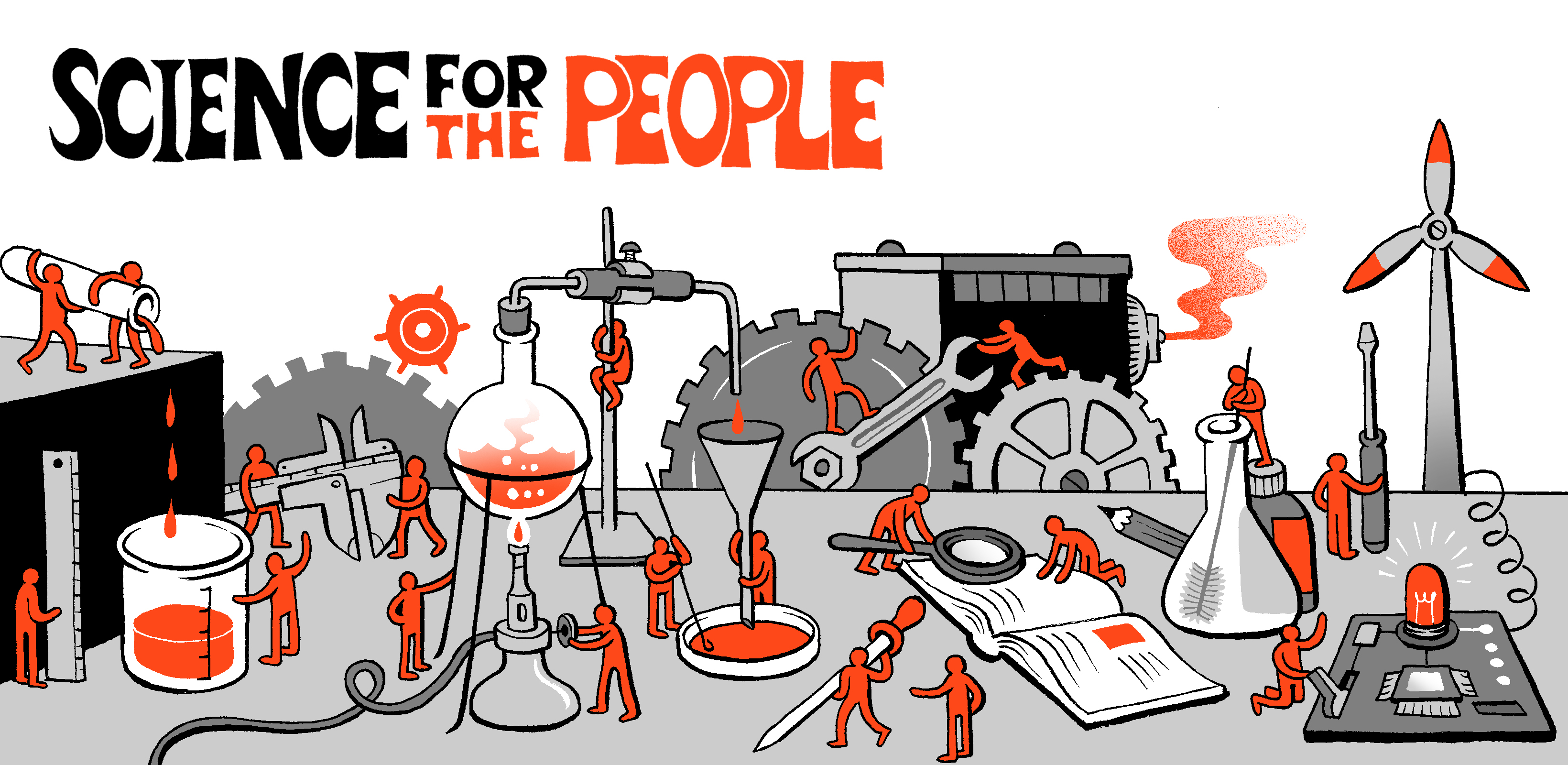Winter 2021 Organizing Reports
Volume 24, no. 3, Cooperation: Theory and Practice for the Commons
Jump to:
You can find previous organizing reports here.
Ames, Iowa
By Nick Hunter and Hamidreza Zobeiri | Contact: nickhunter93@gmail.com
As workers in a mechanical engineering lab at Iowa State University (ISU), we often find ourselves conversing about science’s role in society during our research breaks. After coming across a reference to SftP in an article in The Nation about Rob Wallace,1 we browsed the organization’s website and magazine archives, where we found our office conversations reflected in the writings, activism, and the foundational values of SftP. We knew we wanted to join a chapter and start learning how to transform our conversations into action, but no chapters had sprouted up in Iowa yet. So we inquired about starting a new SftP chapter, and an official chapter was formed shortly after. At the time of writing, we had only three members, but we made plans to expand our membership after our first meeting on November 11, 2021.
A friend helped us design eye-catching flyers promoting the new chapter, and we have been distributing and posting them on campus to recruit faculty and students. In our first meeting, we gave an overview of the history, values, and mission of SftP. We brought up local issues that our chapter could address (as outlined below) and opened up conversation about other potential routes for direct action. Before closing, we collected contact information and set up our chapter’s Slack channel to build our network. We distributed the flyers and posted them at the US Department of Energy Ames Lab located on campus. Given the frequent collaboration between Ames lab and ISU researchers, we hope to take advantage of the opportunity to reach out to scientists working in a national lab. As Helen Zhao has suggested, in addition to “agitating in solidarity for a science for the people” outside of traditional institutions of science, as scientist-activists we must also be working within those same institutions “to organize, politically educate, and empower [our] coworkers.”2
Our future plans involve collaboration with existing organizations already responding to climate justice issues in Iowa. We hope to work with the Climate Reality Campus Corps (CRCC) on efforts to pressure Iowa State University to invest in renewable energy infrastructure, rather than the recently approved $16 million coal-to-gas power plant conversion. We will be joining CRCC members for their weekly Fridays for Future strikes demanding climate action from the ISU administration. We also hope to join efforts to stop false climate solutions like carbon capture and storage. Summit Carbon Solutions, a private company, is planning to construct a CO₂ pipeline that would transport captured carbon emissions from ethanol plants in Iowa and surrounding states to North Dakota. Besides the fact that the carbon footprint from oil refineries would only be reduced by 50 percent, the pipeline is only a short-term fix to the long-term problem of our monoculture food and fuel system (corn and soy for ethanol or livestock feed). Additionally, the compressed CO₂ is likely to be used for enhanced oil recovery (a mockery of decarbonization).3 In addition, the seven hundred mile section of pipeline cutting across Iowa will inevitably disrupt drainage tiles and impact the total crop yield and income of farmers. Citizens for Community Improvement (CCI) based out of Des Moines is already organizing landowners and community members to oppose the proposed pipeline and we hope to connect with them on this effort by joining their monthly climate justice meetings. Eventually, we hope to mobilize Ames SftP members to support direct actions planned by CCI. While our initial plans involve joining existing efforts to address local issues, we envision a future where Ames SftP members collectively find our own role in the broadening coalition of activist movements in our communities.

Back to Top
Ciencia para el Pueblo – México (CpP-Mex)
Contact / Contacto:
Website / Página web: https://cienciaparaelpueblomx.org/
Email / Correo electrónico: cienciaparaelpueblomx@gmail.com
A principios de 2017, colegas de diferentes campos y disciplinas científicas —la mayoría aún estudiantes de licenciatura y posgrado, coincidimos en la necesidad de articular nuestros esfuerzos que— desde distintas experiencias académicas, militantes, comunitarias y en movimientos sociales. Durante años, hemos promovido la participación del gremio científico en los procesos y luchas sociales, incluyendo los múltiples problemas socioambientales.
Tras meses de acercamiento, e identificándonos con los planteamientos y la experiencia histórica de SftP, en enero del 2018 realizamos la reunión inaugural de Ciencia para el Pueblo – México (CpP-Mex). Ese mismo año, una delegación de CpP-Mex asistió a la conferencia de revitalización de SftP en Ann Arbor, Michigan, en la que obtuvimos el reconocimiento como capítulo mexicano. CpP-Mex es una organización amplia, explícitamente anticapitalista, formada principalmente, pero no exclusivamente, por personas dedicadas a la ciencia, ingeniería y educación, quienes además somos participantes de diversas organizaciones o activistas a título individual. Consideramos como algo irrenunciable nuestra independencia política y organización con respecto a partidos políticos y gobiernos. Aplicando la ciencia radical de SftP a las particularidades del contexto de México y Latinoamérica, hemos elaborado una serie de principios que definen la postura de CpP-Mex respecto a temas y problemas trascendentales en nuestra época, y que orientan nuestro actuar como organización.
Quienes conformamos CpP-Mex actualmente estamos distribuidos en diferentes regiones del país, principalmente en Ciudad de México, Michoacán, Oaxaca, Puebla, Quintana Roo y Tlaxcala. Así, abarcamos variados territorios, con sus respectivas particularidades y sus propios procesos y problemas socioambientales. CpP-Mex tiene actividad constante; semana a semana en el grupo circula información, ideas y propuestas, posibilidades de vínculos con otras organizaciones y actores locales, apoyos en conflictos socioambientales, entre otros. Consideramos de alta prioridad la construcción y articulación de fuerzas y capacidades tanto internas como con otras organizaciones: en CpP-Mex es clave actuar colaborativamente. Así, recientemente hemos concretado un artículo para la revista “Palabras pendientes”, de la organización Tejiendo Organización Revolucionaria (TOR), trabajamos en el Grupo de Análisis de Manifestaciones de Impacto Ambiental (GAMIA), nos integramos a la Coordinadora Nacional de Sindicatos Universitarios, de Educación Superior, Investigación y Cultura (CNSUESIC), y colaboramos en diferentes organizaciones y actividades en Yucatán y Michoacán. Además, se han estado incorporando nuevos participantes a CpP-Mex. Es importante el diálogo en curso con compañerxs de la región Sur y Sureste de México, varios de los cuales llevan años ligados a SftP, principalmente en el estado de Chiapas. Pretendemos concretar colaboraciones con actores de otros países de Latinoamérica, e incrementar nuestra colaboración con la revista, grupos de trabajo y Comité Directivo de SftP.
Actualmente, nuestro principal proyecto es la revista “Ciencia para el Pueblo – México” y la pronta publicación del primer número. Esta es una iniciativa editorial independiente y autogestionada, la cual consideramos importante y con fuerte proyección a corto, mediano y largo plazo. El objetivo general de esta revista es contribuir a la divulgación y promoción de ideas, propuestas y perspectivas que aporten a la construcción de una sociedad justa y sustentable. La revista incluirá diferentes secciones, como artículos, entrevistas, reseñas, notas de actualidad e información relevante, con colaboraciones tanto de participantes de CpP-Mex como externos. ¡Esperamos sus colaboraciones!
—
At the beginning of 2017, colleagues from different scientific fields and disciplines—most of us still undergraduate and postgraduate students—agreed on the need to articulate our efforts towards different academic, militant, community, and social movement experiences. For years we had been promoting the involvement of the scientific community in social processes and struggles, including multiple socio-environmental problems.
After months of rapprochement, and recognizing our alignment with the goals and historical experience of SftP, in January 2018 we held the founding meeting of Ciencia para el Pueblo – México (CpP-Mex). That same year, a delegation from CpP-Mex attended the SftP revitalization meeting in Ann Arbor, Michigan, where we were recognized as a Mexican chapter. CpP-Mex is a broad, explicitly anti-capitalist organization, formed mainly but not exclusively by activists dedicated to science, engineering, and education. We consider our political and organizational independence from political parties and governments to be necessary. Applying radical science to the particularities of the Mexican and Latin American context, we have created a series of principles that define the positions of CpP-Mex and guide our actions.
Members of CpP-Mex are distributed throughout different regions of the country, mainly in Mexico City, Michoacán, Oaxaca, Puebla, Quintana Roo, and Tlaxcala. Thus, we cover various territories, each with its own particularities, socio-environmental processes, and problems. CpP-Mex is constantly active. Week to week the group circulates information, ideas, proposals, and possibilities for linking with other organizations and local actors, as we engage with socio-environmental issues. One of our highest priorities at CpP-Mex is cooperation, including building organizational capacity both internally and with other activist groups. We have recently written an article for the magazine “Palabras Pendientes” (“Pending Words”) of the organization Tejiendo Organización Revolucionaria (Weaving Revolutionary Organization); we work in the Grupo de Análisis de Manifestaciones de Impacto Ambiental (Environmental Impact Manifestations Analysis Group); we joined the Coordinadora Nacional de Sindicatos Universitarios, de Educación Superior, Investigación y Cultura (National Coordination of University, Higher Education, Research and Culture Unions), and we collaborate with different organizations in the states of Yucatán and Michoacán. The ongoing dialogue with colleagues from the South and Southeast region of Mexico (mainly in the state of Chiapas), several of whom have been linked to SftP for years, is important. We intend to establish collaborations with activists from other Latin American countries, and to increase our involvement with SftP magazine, working groups, and the Steering Committee.
Currently, our main project is the journal, Ciencia para el Pueblo – México, and the publication of our first issue. This is an independent and self-managed publishing initiative. The general objective of this journal is to contribute to the dissemination and promotion of ideas, proposals, and perspectives that contribute to the construction of a just and sustainable society. The journal will include different sections, such as articles, interviews, reviews, news, and relevant information, with contributions from both CpP-Mexico and external participants. We look forward to your contributions!
Back to Top
Anti-Militarism Working Group
By Jack Fox | Contact: sftp.militarism@gmail.com
The Anti-Militarism Working Group of SftP began reorganizing in May of 2021, during the latest bombing assault on Gaza. It was clear to us that anti-militarism must be rooted in anti-colonialism and that the situation in Palestine is more urgent than ever. We began with the idea of doing Palestine solidarity work and supporting the Boycott, Divestment, and Sanctions (BDS) campaign within the STEM fields. We held individual meetings with organizations involved directly in Palestine solidarity, BDS, and anti-Zionism, like Jewish Voice for Peace, as well as radical STEM organizations such as the Tech Workers Coalition and the Just Mathematics Collective.
In these meetings we learned that the STEM fields are underrepresented in current organizing for Palestine solidarity and that SftP and other radical STEM organizations could help fill this gap. Our very successful first collaborative meeting with Palestinian solidarity and STEM groups coincided with the launching of the #notechforapartheid movement. As we plan for future general meetings, we are looking at different ways to show Palestinian solidarity in the STEM fields. Examples include how we can support Google and Amazon employees in their campaign to end work on Project Nimbus, and how we can work with the international BDS movement on STEM-specific goals.
Back to Top
People’s Science Network
By Ben Allen | Contact: mail@pplsci.net
Did you know that Science for the People (SftP) magazine has a fiscal sponsor, People’s Science Network (PSN)? PSN acts as a fundraising body for SftP, supporting the longevity and impact of our magazine publication and the organizing projects of our affiliated groups. We raise money for organizing efforts and to pay writers and artists for their contributions to the magazine. Operations are currently managed by a volunteer-based Board of Directors and an Advisory Council. Board members take on responsibilities that forward the work of PSN and are entitled to vote on proceedings. At present, the Board consists of a president and three co-secretaries. The Advisory Council is composed of people involved in the organizing and publishing work of SftP and its affiliates. Together, these bodies support PSN by providing knowledge, contacts, and experience to guide our strategy and development. We are always looking for more help, so if you are interested in volunteering for the Board or Council, please reach out to us.
What’s the PSN been up to? Since our last report in SftP magazine, we’ve been busy putting together support materials and training for using the PSN’s resources as organizing tools. We’ve begun consolidating broadcast communications into an Action Network to help build a base of support, promote SftP, and raise funds. You can tell we have trained the Publication Committee on using Action Network, as you should have seen promotional emails about the latest issues of SftP magazine coming from there! Soon we will do the same for the Steering Committee to understand the organization’s communication needs. In addition, PSN Board member fern MacDougal successfully secured a micro-grant for SftP from the Ben and Jerry’s Foundation (“Grassroots organizing for social change”)! Speaking of funding, we now have a fiscal sponsorship policy and started accepting applications from groups affiliated or allied with SftP. So, if you or your chapter are looking to fund your organizing projects, do reach out!
What’s next for the PSN? Once we settle into our new process and tools, we’d like to explore applying for larger grants to sustain and support people in SftP doing organizing and creative work. We are certainly aware of the many problems with major nonprofit funders, so we will be seeking advice and resources from the SftP community to help identify funders we can work with. Let us know if this interests you!
You can support PSN by making a tax-deductible donation by mailing a check to:
People’s Science Network
PO Box 3817
Knoxville, TN 37927
The People’s Science Network Board of Directors
Ben Allen – President
Andrew Butts – Co-secretary
fern MacDougal – Co-secretary
Ashley Theissen – Co-secretary
Back to Top
Notes
- “Principios de Unidad de Ciencia para el Pueblo – México,” Ciencia para el Pueblo – México, accessed December 6, 2021, https://cienciaparaelpueblomx.org/principios/.
- “Comentarios a la MIA-R del proyecto denominado ‘Tren Maya Fase 1’,” Entradas, Ciencia para el Pueblo – México, accessed July 30, 2020, https://cienciaparaelpueblomx.org/blog/2020/07/30/comentarios-a-la-mia-r-del-proyecto-denominado-tren-maya-fase-1/.
- “Invitación a colaborar en la revista CIENCIA PARA EL PUEBLO – MÉXICO,” Entradas, Ciencia para el Pueblo – México, accessed May 10, 2021, https://cienciaparaelpueblomx.org/blog/2021/05/10/invitacion-a-colaborar-en-la-revista-ciencia-para-el-pueblo-mexico/.
- Eamon Whalen, “The Unemployed Epidemiologist Who Predicted the Pandemic,” The Nation, August 30, 2021, https://www.thenation.com/article/society/rob-wallace-profile/.
- Helen Zhao, “What Is a Radical Analysis of Science?”, Science for the People 22, no. 1 (May 29, 2019), https://magazine.scienceforthepeople.org/vol22-1/what-is-a-radical-analysis-of-science/.
- The Associated Press, “Iowa Company Wants to Store Carbon Dioxide under North Dakota,” MPR News, March 2, 2021, https://www.mprnews.org/story/2021/03/02/iowa-company-wants-to-store-carbon-dioxide-under-north-dakota.





